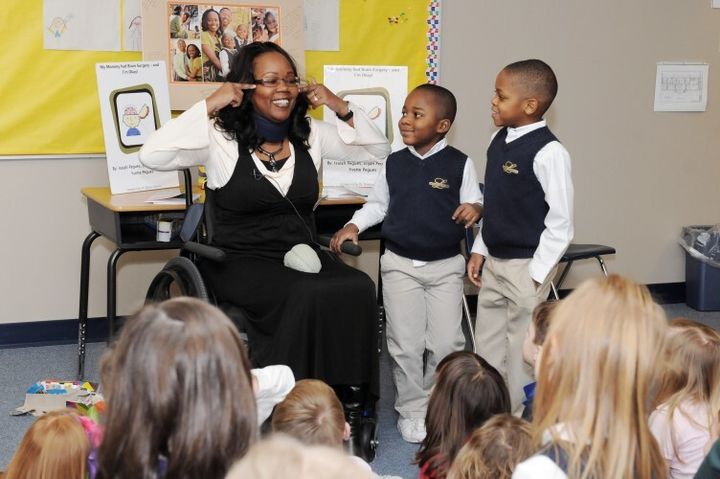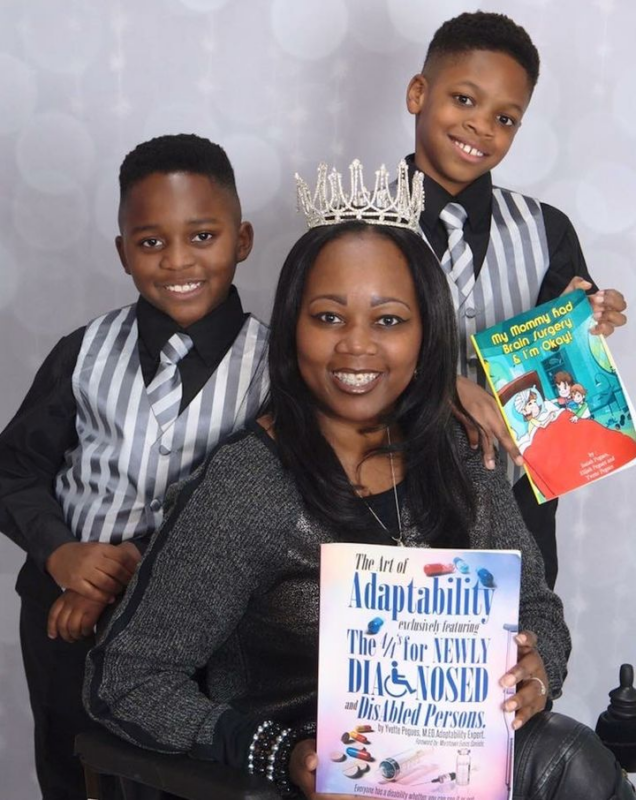News
I Was ‘Supermom.’ When I Suddenly Became Disabled, I Expected Empathy — Not This.
This Mother’s Day, I’ll be hugging my sons a little tighter. Our family’s path has been unexpected and unordinary, from me being at the top of my career to becoming a disabled mother. Our bonds are strong, but we are constantly reminded of how society underestimates parents like me.
After five devastating miscarriages, I finally became a mom to two healthy boys, now ages 15 and 17. When they were young, our world was upended. I was diagnosed with Arnold-Chiari malformation, a traumatic brain abnormality ending with spinal cord damage that abruptly and permanently caused me to rely on a wheelchair and a caregiver for daily tasks.
After my disability created severe impairments and limitations, the unthinkable happened: People questioned if I could properly care for my children. In my darkest moments, school officials who used to applaud my parenting now wondered if I was up for the task. They told me that if I wasn’t capable of parenting, I would need to seek help from organizations that I knew might attempt to terminate my parental rights. As I relearned basic functions, I also had to grapple with the chilling fear of losing my sons.
Unfortunately, my story is not unique. Starting a family is regarded as a basic human right, but parents with disabilities experience discrimination that has real-world consequences.
Parents with disabilities, especially intellectual or developmental disabilities, face shockingly high referral rates to child protective services. Even worse, up to 80% of parents with IDDs will lose custody of their child, often for perceived inadequacies rather than evidence of neglect or abuse. No mother should have to prove that her child belongs with her, but this degrading demand is frequently placed on many people with disabilities. Many choose not to have children under the weight of that fear. As a Black, disabled, Afro Latina woman, the presumptions of my ineptitude as a mother are multiplied.
My own children endured cruel bullying from peers and parents. They have been asked, “How are you able to be a kid?” and told, “You don’t have a real mommy.” I couldn’t participate in activities in their upstairs classrooms or chaperone field trips, and my sons were continually questioned about my absence. They asked me, “How can we tell these people we’re OK?” We brainstormed and created vision boards, which led to writing a book. It gave them a tool to respond to critics and bullies and to share their lives with the world with confidence and joy.
Courtesy of Yvette Pegues
Our experiences became a motivating yet insidious force. Because I had been the parent who primarily handled the day-to-day needs of the boys before I was diagnosed, our situation was seen as a household issue and school officials assumed it was a burden, as the standard of care had changed. To prove my capability as a mother, I had to maintain a facade of recovery before I was ready.
During rehabilitation, I faced microaggressions where simple requests for help were weaponized against me. When I sent my boys to stay with family during a major surgery, this act was portrayed as a weakness rather than a strength. Even when they were little, people would talk with my children instead of speaking with me, which often happens to people with disabilities. Every day, I was fearful that authorities would judge my shaky hands or cognitive lapses as signs of unforgivable neglect. I taught my boys to stay close to me and hold on to my wheelchair because I was afraid to leave them alone.
Before my disability, I epitomized the “supermom” who did it all while my husband played “fun dad.” Our new reality forced us to reframe parenting roles. My husband had to participate more intentionally and learn basic caregiving duties — meals, bath time and everything else. In turn, I opened our home to friends, neighbors and members of my church who helped while I healed.
I evolved from a supermom into an engaged, patient parent. I wasn’t in a rush because I couldn’t be in a rush. I read and talked with my children. I took them to therapy and adaptive sporting events. Before I relearned to drive a car, I drove my wheelchair to their school, and we’d walk and roll a mile home together.
I savored every developmental milestone, even tantrums or having to count to 10. Frustration gave way to amazement that my sons were developing appropriately. I created a child-led learning environment, using household routines and nature as teaching moments. I also let them teach me, which was made easier because my wheelchair was always at their eye level. My disability organically became a powerful bonding tool.
I embraced vulnerability and allowed my sons to see my disability without shame. Early on, if I had a seizure or bout of vomiting, my husband would close the door to protect them, and my youngest would anxiously wait on the other side. We let him in when it was safe and allowed both of our sons to decide how much they wanted to know about what I was experiencing. My youngest would help me wipe my face, and my oldest would wait until I was feeling better to rub my back. I would let them touch my stitches from brain surgery as they healed, and my sons drew what these looked like on paper to help process what happened. I wanted to be strong for them, and they ended up being strong for me.
I live with chronic pain, but I continue to show up for my children — including by substitute-teaching at their school and volunteering to help those less fortunate in our community. A nurturing household uplifts both parents and children in beautiful ways, and I’ve watched their emotional intelligence and compassion bloom.
The painful prejudices we’ve faced could have broken us, but instead they became gifts. We went from subjects of harmful gossip to examples of unshakable perseverance whenever our wheelchair-accessible van rolled up at school. My sons learned empathy, advocacy and caregiving, and they became my unwavering support system. Now, as teens, they are advocates who take initiative to clear paths for my wheelchair before I arrive. They proudly introduce me to friends and teachers, saying, “You have to meet my mom!” They taught me to embrace my disability and find strength in our story. Whether it’s through Ms. Wheelchair USA competitions or TV interviews, my kids always say, “Wow, Mommy, we can reach more people now.” My disability became my parenting superpower.

Courtesy of Shepherd Center
This Mother’s Day, I celebrate far more than motherhood. Our lives may be nontraditional, but they are joyfully rich and bonded by deep admiration for each other. My sons are my biggest fans, and I will always be theirs.
Parents with disabilities are resilient, but many don’t have resources and support. The fear of being reported or having their disabilities weaponized keeps many isolated. That’s why we desperately need systemic changes to support parents with disabilities, shielding them from unfair judgments or family separations. We should reach out first to help, not to hurt. More stories that normalize disability within family units are crucial to shift cultural values.
It’s important that nondisabled parents communicate inclusion early and model what it looks like to be an ally. Invite someone with a disability to your house. When kids ask about wheelchairs or accessible spaces, such as the “big stall” in the restroom, educate them about selflessness, access and acceptance. Parenting is hard enough as is, so don’t make it harder for others. Feed your child’s innate curiosity with empathy and kindness — the very qualities I’ve worked to model as a disabled mother.
I hope that my family’s path makes a difference for people with disabilities who are parents or want to be parents. Our dreams matter, and we deserve to experience the universal joys and struggles of parenthood just like everyone else.
Yvette Pegues, Ed.D., began her career as a scientist and emerged an activist after suffering from a traumatic brain and spinal cord injury. She is a disabled DEIAB (diversity, equity, inclusion, access and belonging) executive, engineer, diversity champion and keynote/TEDx speaker. She is also the co-founder and chief diversity officer of Your Invisible Disability Group, as well as a board member with The Arc of the United States. In her spare time, she enjoys 20-plus adapted sports and recognizes activity as a form of activism.
Do you have a compelling personal story you’d like to see published on HuffPost? Find out what we’re looking for here and send us a pitch at pitch@huffpost.com.
Read more

